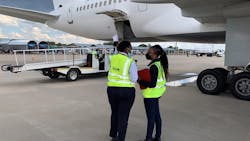Africa’s Opportunities and Obstacles
Opportunities for the ground handling sector abound all across Africa, but at the same time economic and political instability in some African countries can affect the growth prospects of the ground handling sector.
According to Vees Lochan, chief operating officer at Airlines Association of Southern Africa (AASA), the African continent offers opportunities for the ground handling sector to grow alongside airline operations.
“The potential for air travel in Africa is huge. Presently Africa with 17 percent of the world’s population only contributes about 2 percent of total global travel. Air connectivity on the continent can be vastly improved. The boom in air travel in Africa is bound to materialize and with it will result in opportunities for the ground handling sector to grow,” he says.
“The implementation of the Single African Air Transport Market (SAATM) will definitely lead to increased levels of air traffic, but the primary obstacle remains the limited connectivity between most countries in Africa,” Lochan continues. “Protectionism is also another major obstacle because it means that countries are prioritizing state-owned airlines over national economies. Countries need to be liberal in their admission policies with respect to air travelers, especially for fellow Africans who should be encouraged to travel visa-free within the continent. By so doing, traffic increases and tourism will prosper, the economy will grow, jobs will be created – a win-win scenario for all.”
Opportunities and Obstacles
Rising traffic and resultant demands for more efficient and modern ground handling services means real opportunities lie in general aviation (GA) handling, according to the UAS International Trip Support Africa team.
“GA flight traffic is fast-growing and becoming popular throughout the African continent. It comes with its own unique and complex requirements especially when it comes to business/VIP flights. Several countries in Africa have recently undertaken major airport development, prompted by an increase in flight movements into the continent, and this has presented an opportunity for additional ground handling companies and for existing ones to grow,” UAS Africa team members say.
“New, large airport terminals recently opened in Ethiopia and Tanzania, for example, and opened for additional ground handling companies, hence creating competition and a reason for the current handlers to upgrade their services and quality of service delivery,” they add. “The general increase and projected increase in air traffic in Africa has played a big part in growing the ground handling business.”
Concerning the obstacles to the growth of the ground handling sector, the UAS Africa team believes that one main obstacle is the stagnation of airport infrastructure.
“Many airports in Africa are small with limited capacity for large aircraft and this inhibits ground handlers from investing in ground support equipment (GSE) or in growing their businesses,” say UAS Africa team officials. “Another obstacle at many airports is a competition for space. Many airports have just enough space for parking of aircraft and would not accommodate more than a handful of handling companies. In addition, some states still have and encourage monopolies in the ground handling space, thereby limiting entry of potential participants and investors that could encourage growth. Finally, the poor state of African economies especially after the COVID pandemic has made them unable to prioritize airport development to the disadvantage of the possible growth of ground handling.”
Infrastructural Developments
Several countries in Africa are investing in the expansion and modernization of their airports, which can create opportunities for the growth of ground handling services, observes Swissport officials.
“There are many projects for new airports or modernizations/extensions across the continent, which are necessary to accommodate the planned growth in air traffic, for example Kumasi, Ghana, Bugesera, Rwanda, Entebbe, Uganda, and Luanda, Angola,” Swissport representatives say.
Currently, some international financiers are supporting the development of mega airports in Africa to create more efficient trading avenues through wide-body aircraft, explains the UAS Africa team.
“Rwanda is building a new and much larger airport 40km from Kigali and this will undoubtedly attract more flights, grow the existing ground handling companies and probably attract more,” UAS Africa team officials say. “With the help of Middle East nations, Somalia has attracted new airport development projects especially in the northern regions, which are deemed more politically stable with less security risks. This is likely to bring in more flights to the region causing ground handling ventures to grow.”
Uganda’s Entebbe International Airport is undergoing a major upgrade and expansion, which will include the revamping of its runways, construction of new passenger terminals and a new cargo center, the UAS Africa team affirms.
“The renovations are expected to increase passenger traffic and freight at the airport. Airports in Sierra Leone, Guinea Conackry, Guinea Bissau, Senegal and Niger have all been going through modernization and expansion towards increasing traffic and creating more opportunities for ground handling,” UAS Africa team members say.
Airports constantly invest in capital projects in terms of capacity and technology to satisfy the growing demand, points out Lochan.
“Air traffic in Africa has not yet achieved pre-pandemic passenger levels so the infrastructure suffices for the moment. An increased level of investment in airport infrastructure developments in Africa will come as the industry recovers and even grows beyond the pre-pandemic levels,” he says.
Joint Venture Opportunities
Foreign ground handling companies are present in Africa and are in partnership with local companies in certain instances to deliver ground handling services, observes Lochan.
“They provide the necessary expertise and capital to operate very successful ground handling services companies. Partnership with local companies will result in mutual benefit. Foreign investment and the provision of equipment opens doors for doing business in the ground handling sector,” he says.
Regulations on partnerships vary between countries. But for the majority of Africa, it is relatively easy for foreign companies to set up ground handling services, according to the UAS Africa team.
“Some countries’ regulations require partnerships of foreign handlers with local companies, which has not been a problem. Where such partnership is allowed by choice, many local ground handlers prefer to partner with well-established foreign handling companies to create a wider business network,” say officials with the UAS Africa team.
The standards of ground handling at airports in Africa vary widely, observes Swissport representatives.
“The infrastructure and facilities for handling passengers/cargo in some airports remain inadequate or dilapidated. Joint ventures with local companies are possible with all attached risks and opportunities,” Swissport officials say. “In some countries having a local partner is mandatory. But in general, partnering with a local company, helping to understand local rules and regulations, can be a key factor for success in delivering ground handling services in Africa.”
The main strength is the youth of African population and the availability of qualified workforce ready to be trained in the ground handling field of activities, according to Swissport officials.
“The African youth is willing to work, eager to learn and international handling companies can provide them with career opportunities The African ground handling staff is often well-versed in the diverse cultural norms and practices of the region,” Swissport representatives say. “This cultural sensitivity is beneficial in dealing with passengers, crew and other stakeholders from different cultural backgrounds, ensuring smooth interactions and efficient ground handling operations.”
The compliance with regulatory requirements for aircraft ground handling, including safety and security regulations, may vary across African countries, affirms Swissport leaders.
“Inconsistent regulatory practices can pose challenges in ensuring standardized and consistent ground handling operations. The vastness and diverse geography of Africa can pose challenges. Remote or inaccessible locations and limited connectivity can impact the speed and efficiency of ground handling operations, especially in remote or less developed regions,” Swissport officials say.
According to the UAS Africa team, the lack of standardization represents a limitation.
“Airports of the same size will have different GSE and standards. In addition, many airports in Africa are government-owned and funded, and with the global economic challenges that affect many governments, funding for maintenance and improvement of airports may be limited,” say members of the UAS Africa team.
According to Lochan, high costs, the complex regulatory environment and erratic economic growth are indeed common in the ground handling sector in Africa.
“GSE is purchased in hard currency, this contributes to the high cost of ground handling services in Africa,” he says. “The potential to prosper in the African aviation industry and the implementation of SAATM will provide opportunities in the ground handling sector."
About the Author

Mario Pierobon
Dr. Mario Pierobon provides solutions in the areas of documentation, training and consulting to organizations operating in safety-sensitive industries. He has conducted a doctoral research project investigating aircraft ground handling safety. He may be reached at [email protected].
